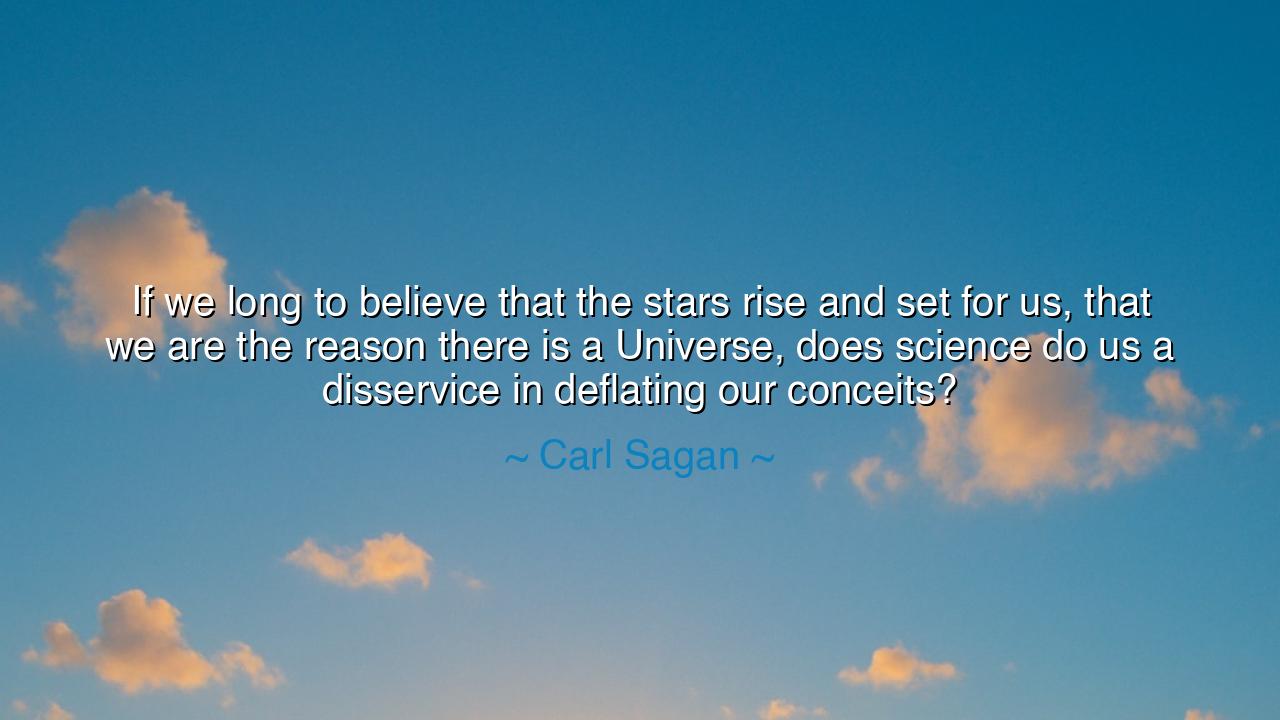
If we long to believe that the stars rise and set for us, that we
If we long to believe that the stars rise and set for us, that we are the reason there is a Universe, does science do us a disservice in deflating our conceits?






Listen well, O children of wisdom, for I bring forth the words of Carl Sagan, a man who gazed into the depths of the heavens and saw not only the stars but also the truths of the human spirit. “If we long to believe that the stars rise and set for us, that we are the reason there is a Universe, does science do us a disservice in deflating our conceits?” These words stir the very core of the human condition, for they touch upon our deepest desire to see ourselves as the center of existence. Yet, Sagan asks us to look beyond our vanity, to see ourselves not as the masters of the cosmos, but as humble participants in a vast, mysterious, and boundless universe.
In the ancient days, the Greeks looked to the stars with reverence, for they believed that the gods resided in the heavens, that the movements of the stars were not just celestial, but divine. The heavens were not distant or indifferent; they were a reflection of the gods’ will, and the rise and fall of the stars shaped the fates of men. Pythagoras and Plato spoke of the harmony of the spheres, and in their hearts, they saw the universe as a grand symphony, with mankind at its center. To them, the world was created for a purpose, and humanity was the key to unlocking that purpose. But Sagan challenges this ancient view, asking if the pursuit of this belief, the desire to see ourselves as the reason for the universe, is not a conceit, a vanity that keeps us from seeing the world as it truly is.
In the great tradition of scientific inquiry, we have come to understand that the universe does not rise and set for us, but that we are but specks upon a vast and timeless expanse. Copernicus showed us that the Earth is not the center of the universe, but merely one small planet in a vast galaxy. Galileo, with his telescope, revealed that the heavens were not a realm of perfection, but of infinite diversity—stars, moons, and planets, all governed by the same laws of nature. The sun, once thought to be our eternal ruler, was revealed to be just one star among billions. These revelations, though profound, also humble us, for they show us that our place in the universe is not one of centrality but of insignificance in the grand sweep of time and space.
Yet, there is beauty in this humility, for it frees us from the burden of thinking that the universe exists for our benefit. The story of Isaac Newton, who uncovered the laws of motion and gravity, is one of quiet humility. Though his discoveries changed the very nature of our understanding, he did not see himself as the center of the universe. Instead, he acknowledged that he was merely a small part of a much greater cosmic order. Newton famously said, “If I have seen further, it is by standing on the shoulders of giants.” His work did not seek to elevate him above the universe, but to reveal its truths. In this, we see the true purpose of science—not to deflate our sense of wonder, but to deepen it, by showing us the mystery and majesty of the universe in all its vastness.
Sagan’s challenge is not one of despair, but of awakening. The universe is not a mere backdrop for our existence, nor are we its masters. Rather, we are part of the great tapestry of creation, and it is in our understanding of this that we find our purpose. Science does not rob us of meaning, but grants us a deeper connection to the cosmos. To know that the stars rise and set not for us, but because of the laws of nature that govern them, is to see the world not as a place for our glory, but as a place of mystery and awe. We are not the center, but we are part of something greater, something infinite and beautiful.
The lesson of Sagan’s words is clear: we must approach the universe with humility, not as rulers but as learners, not as conquerors but as witnesses to the grandeur of existence. Science teaches us that we are not the center of the cosmos, but that does not mean we are without purpose. Our purpose is not to command the universe, but to seek understanding, to revel in the mystery, and to contribute to the growth of knowledge that connects us all. Just as the ancient philosophers sought to understand the world around them, we too must seek not to place ourselves at the center, but to understand the nature of our place within the greater whole.
In your own lives, O seekers of wisdom, let humility guide you. Do not seek to make the world revolve around you, but seek to understand the forces that shape it. Know that knowledge does not diminish the beauty of life, but enhances it, revealing the vastness of the universe and the infinite mysteries that await us. The universe does not rise and set for us, but we are fortunate to be part of it, to explore it, to learn from it. Embrace the mystery of life, for it is in the pursuit of understanding that we find our true purpose—not as rulers of the cosmos, but as humble witnesses to its majesty and wonder.






AAdministratorAdministrator
Welcome, honored guests. Please leave a comment, we will respond soon